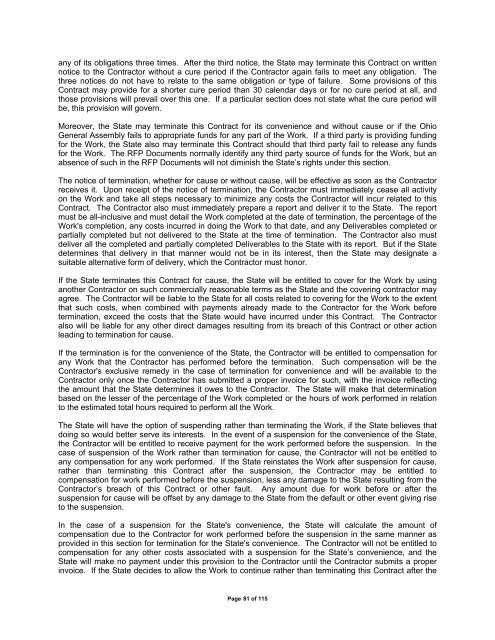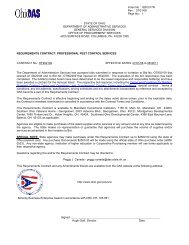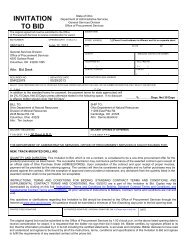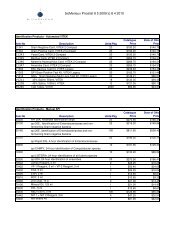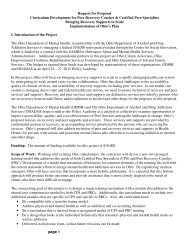REQUEST FOR PROPOSALS RFP NUMBER: 0A1031 DATE ISSUED
REQUEST FOR PROPOSALS RFP NUMBER: 0A1031 DATE ISSUED
REQUEST FOR PROPOSALS RFP NUMBER: 0A1031 DATE ISSUED
Create successful ePaper yourself
Turn your PDF publications into a flip-book with our unique Google optimized e-Paper software.
any of its obligations three times. After the third notice, the State may terminate this Contract on written<br />
notice to the Contractor without a cure period if the Contractor again fails to meet any obligation. The<br />
three notices do not have to relate to the same obligation or type of failure. Some provisions of this<br />
Contract may provide for a shorter cure period than 30 calendar days or for no cure period at all, and<br />
those provisions will prevail over this one. If a particular section does not state what the cure period will<br />
be, this provision will govern.<br />
Moreover, the State may terminate this Contract for its convenience and without cause or if the Ohio<br />
General Assembly fails to appropriate funds for any part of the Work. If a third party is providing funding<br />
for the Work, the State also may terminate this Contract should that third party fail to release any funds<br />
for the Work. The <strong>RFP</strong> Documents normally identify any third party source of funds for the Work, but an<br />
absence of such in the <strong>RFP</strong> Documents will not diminish the State’s rights under this section.<br />
The notice of termination, whether for cause or without cause, will be effective as soon as the Contractor<br />
receives it. Upon receipt of the notice of termination, the Contractor must immediately cease all activity<br />
on the Work and take all steps necessary to minimize any costs the Contractor will incur related to this<br />
Contract. The Contractor also must immediately prepare a report and deliver it to the State. The report<br />
must be all-inclusive and must detail the Work completed at the date of termination, the percentage of the<br />
Work's completion, any costs incurred in doing the Work to that date, and any Deliverables completed or<br />
partially completed but not delivered to the State at the time of termination. The Contractor also must<br />
deliver all the completed and partially completed Deliverables to the State with its report. But if the State<br />
determines that delivery in that manner would not be in its interest, then the State may designate a<br />
suitable alternative form of delivery, which the Contractor must honor.<br />
If the State terminates this Contract for cause, the State will be entitled to cover for the Work by using<br />
another Contractor on such commercially reasonable terms as the State and the covering contractor may<br />
agree. The Contractor will be liable to the State for all costs related to covering for the Work to the extent<br />
that such costs, when combined with payments already made to the Contractor for the Work before<br />
termination, exceed the costs that the State would have incurred under this Contract. The Contractor<br />
also will be liable for any other direct damages resulting from its breach of this Contract or other action<br />
leading to termination for cause.<br />
If the termination is for the convenience of the State, the Contractor will be entitled to compensation for<br />
any Work that the Contractor has performed before the termination. Such compensation will be the<br />
Contractor's exclusive remedy in the case of termination for convenience and will be available to the<br />
Contractor only once the Contractor has submitted a proper invoice for such, with the invoice reflecting<br />
the amount that the State determines it owes to the Contractor. The State will make that determination<br />
based on the lesser of the percentage of the Work completed or the hours of work performed in relation<br />
to the estimated total hours required to perform all the Work.<br />
The State will have the option of suspending rather than terminating the Work, if the State believes that<br />
doing so would better serve its interests. In the event of a suspension for the convenience of the State,<br />
the Contractor will be entitled to receive payment for the work performed before the suspension. In the<br />
case of suspension of the Work rather than termination for cause, the Contractor will not be entitled to<br />
any compensation for any work performed. If the State reinstates the Work after suspension for cause,<br />
rather than terminating this Contract after the suspension, the Contractor may be entitled to<br />
compensation for work performed before the suspension, less any damage to the State resulting from the<br />
Contractor’s breach of this Contract or other fault. Any amount due for work before or after the<br />
suspension for cause will be offset by any damage to the State from the default or other event giving rise<br />
to the suspension.<br />
In the case of a suspension for the State's convenience, the State will calculate the amount of<br />
compensation due to the Contractor for work performed before the suspension in the same manner as<br />
provided in this section for termination for the State's convenience. The Contractor will not be entitled to<br />
compensation for any other costs associated with a suspension for the State’s convenience, and the<br />
State will make no payment under this provision to the Contractor until the Contractor submits a proper<br />
invoice. If the State decides to allow the Work to continue rather than terminating this Contract after the<br />
Page 81 of 115


